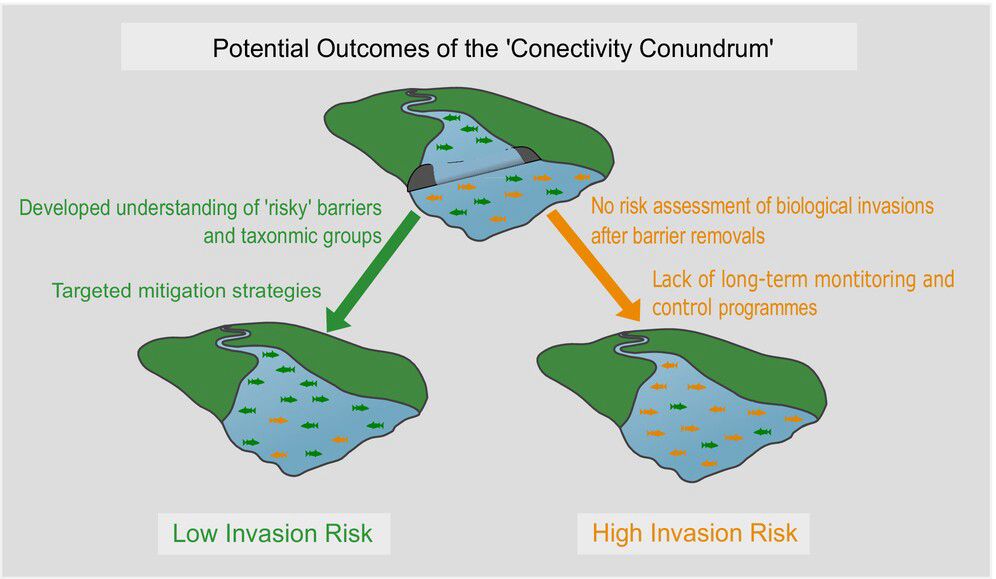
ICMB XIII goes to Cape Town, South Africa!
The next International Conference on Marine Bioinvasions is now confirmed for 2027! Follow for more updates.
Hope to see you there!
@marinebioinvasions.bsky.social #bioinvasions #NIS #marinebioinvasions #ICMB2027 #capetown #southafrica
09.10.2025 18:35 — 👍 9 🔁 7 💬 0 📌 0
Double Trouble: Aquatic Invasive Plants Can Promote Mosquitoes
You have to enable JavaScript in your browser's settings in order to use the eReader.
What can medical entomology learn from invasion science?
Our new paper in Ecology Letters explores the potential links between aquatic plant invasions and the global proliferation of vector mosquitoes
onlinelibrary.wiley.com/doi/epdf/10....
02.10.2025 06:56 — 👍 4 🔁 0 💬 0 📌 1

Funded PhD opportunity in our lab with NorthWestBio DTP:
Assessing the role of plant invasions in mosquito-borne disease risk
Plant invasions transform ecosystem structure, but can they promote insect vectors and associated disease risks?
Deadline 21 November 2025
www.gla.ac.uk/postgraduate...
30.09.2025 12:28 — 👍 1 🔁 1 💬 0 📌 0
Had the pleasure of sharing our #mosquito and #midge research with @itvnews.bsky.social earlier this week
We are unravelling the insect vector composition and disease risk in Northern Ireland for the first time in decades, with temperate areas increasingly at risk
www.itv.com/watch/news/m...
22.08.2025 14:03 — 👍 1 🔁 0 💬 0 📌 0

Ecological similarity governs non-native fish establishment while human pressure and native diversity shape invasion richness
Closely related fish species are more likely to invade, while human activity drives the number of invaders in a community.
Darwin's naturalisation conundrum poses two conflicting hypotheses around invasion processes
Using ~3000 North American fish communities, we show that native relatatedness promotes non-native establishment, but invasion richness links more strongly to human drivers
www.science.org/doi/10.1126/...
09.08.2025 11:32 — 👍 6 🔁 1 💬 0 📌 1
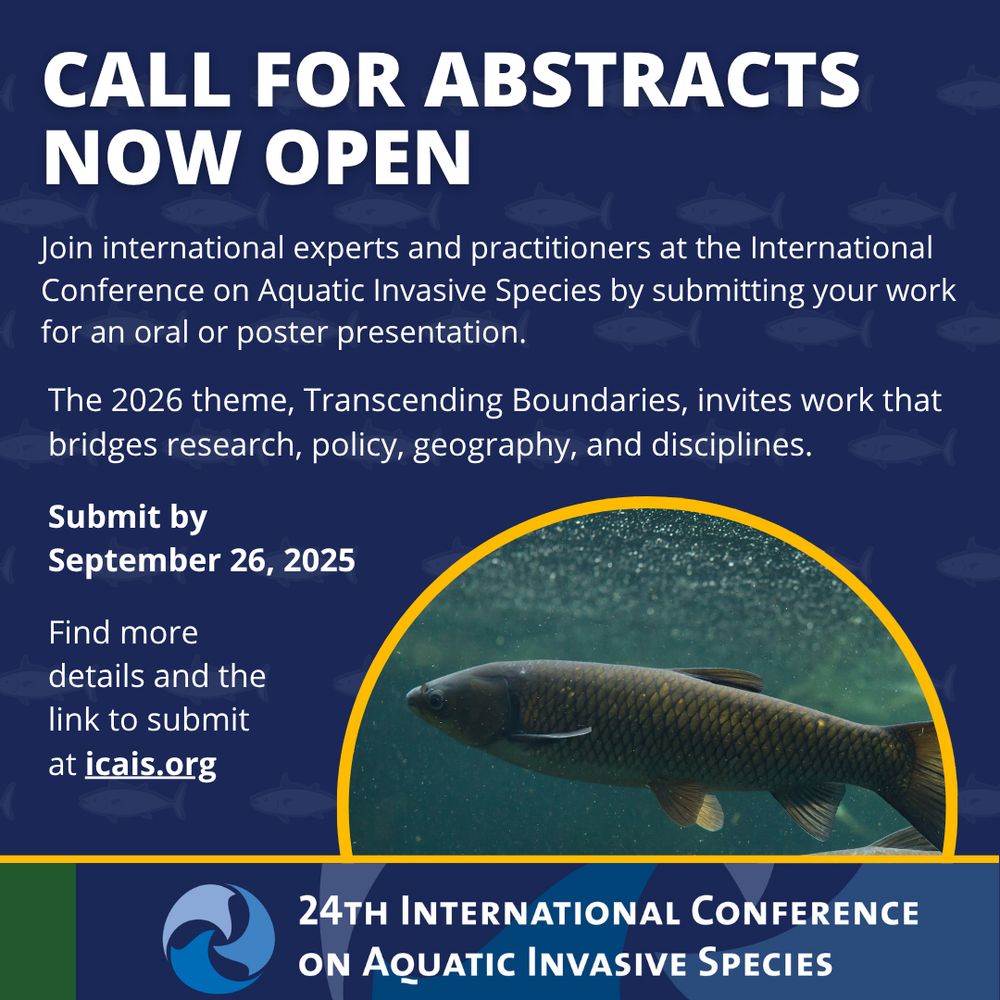
Abstract submissions have just opened for #ICAIS2026, hosted in Northern Ireland at @qubelfastofficial.bsky.social
The conference theme is "Transcending Boundaries", considering habitats, disciplines, regions, and research-policy interfaces
Deadline: September 26, 2025
icais.org/icais-2026/c...
01.08.2025 10:01 — 👍 3 🔁 4 💬 0 📌 0

🦟"Vertical transmission in field-caught #mosquitoes identifies a mechanism for the establishment of #Usutu #virus in a temperate country" by Mirjam Schilling et al. at APHA, ZSL, @ukhsa.bsky.social in Scientific Reports @natureportfolio.nature.com
www.nature.com/articles/s41...
15.07.2025 11:01 — 👍 3 🔁 2 💬 0 📌 0
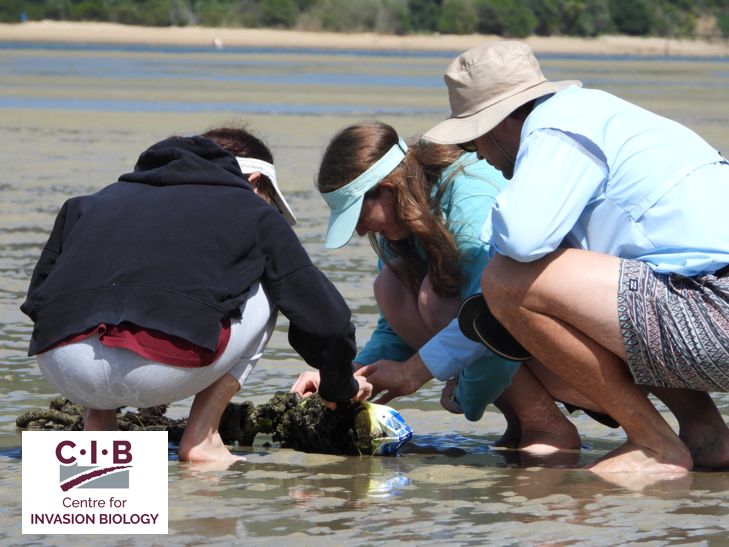
We are recruiting! Looking for a dynamic, self-motivated, field-work loving post-doc to join our team working on invasions in MPAs. More details here: blogs.sun.ac.za/cib/project/...
#MarineBioinvasions #bioinvasions #MPAs
13.07.2025 19:39 — 👍 1 🔁 3 💬 0 📌 0
The #mosquito season is truly underway in these celtic lands. We're seeing an uptick in Scotland, and #Mosquito Northern Ireland friends Ryan Carmichael & @rosscuthbert.bsky.social got these in a trap in #Armagh today.
You can report mosquito sightings in Scotland -
www.mosquito-scotland.com
26.06.2025 08:43 — 👍 1 🔁 2 💬 0 📌 0


Followed by @rosscuthbert.bsky.social on why urban species can be successful invaders & @elliedolan.bsky.social on how to balance river barrier removal and invasive species management
10.06.2025 10:47 — 👍 6 🔁 2 💬 1 📌 0
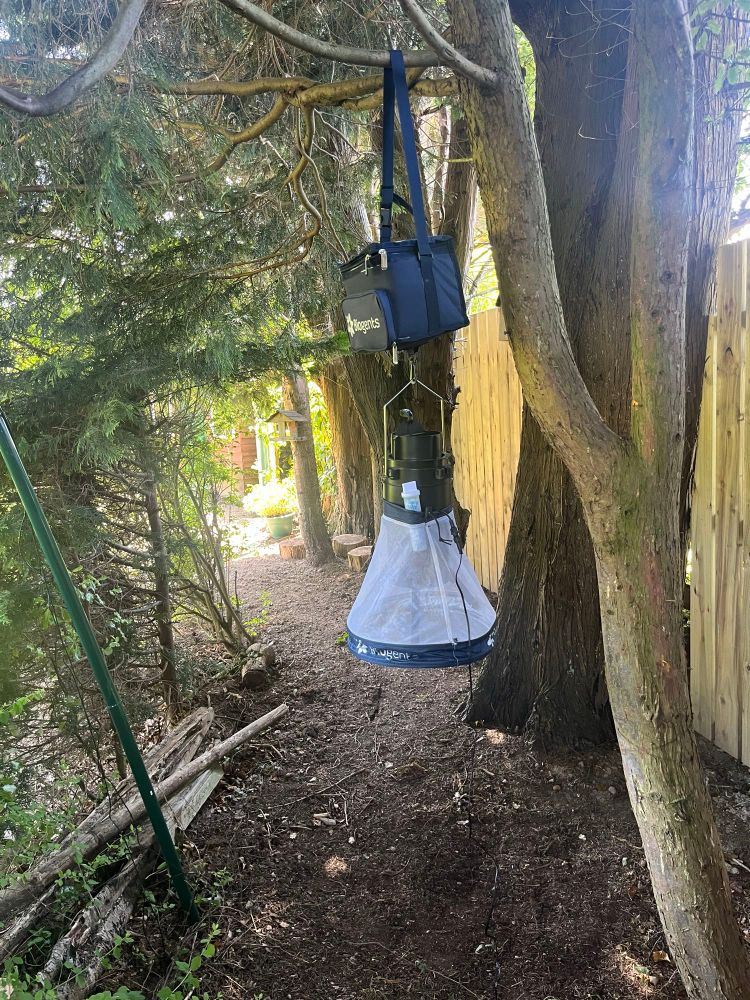
Mosquito trapping underway in Northern Ireland. Interested to see what the season (including my garden) will bring #MosquitoNI
An exciting collaboration with the inspiring @mosquitoscotland.bsky.social team
15.05.2025 16:48 — 👍 2 🔁 1 💬 0 📌 1
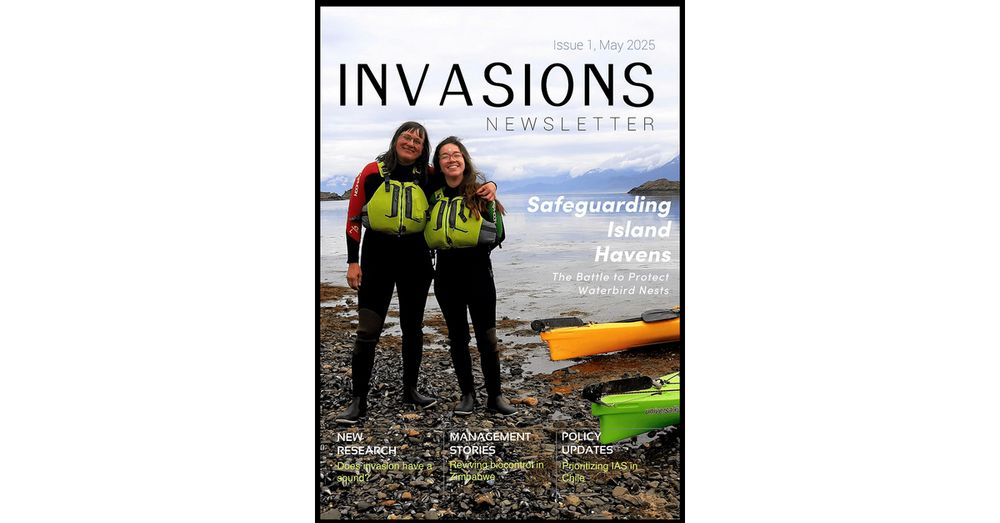
Invasions Newsletter
safeguarding island havens. new research. management stories. policy updates.
📣📣 We would like to introduce the bi-annual #InvasionsNewsletter, an open-access digital magazine and a collaborative effort of individuals, networks, and organizations from around the world! You can access it here:
joom.ag/mIjd
14.05.2025 20:26 — 👍 38 🔁 19 💬 4 📌 5
Home - ICAIS
The (ICAIS) is the most comprehensive international forum to address new and emerging issues related to aquatic invasive species (AIS) in freshwater, marine and estuarine environments. ICAIS provides ...
This paper was conceptualised during a special session at the 2022 International Conference on Aquatic Invasive Species (ICAIS) in Oostende, Belgium.
We are hosting the next ICAIS on campus at @qubelfastofficial.bsky.social in 2026 — find out more here: icais.org
23.04.2025 18:12 — 👍 0 🔁 0 💬 0 📌 0

Researchers show that warming and latitude shape the non-consumptive effects of both native and invasive alien crayfish predators on damselfly prey.
doi.org/10.3897/neob...
15.04.2025 11:28 — 👍 3 🔁 2 💬 0 📌 0

A group of people stand on steps in front of a brick building with arched doorways.
A great meeting today of our researchers who are working on projects that focus on the theme of Enabling Fair Transitions.
#ClimateAction #Research
04.04.2025 15:19 — 👍 4 🔁 2 💬 0 📌 0

Registration is OPEN for #ICMBXII!
Join us October 7–9, 2025, in Funchal, Madeira Island, #Portugal for a gathering of experts, researchers, and ocean enthusiasts tackling #marine #bioinvasions!
🔗 Register now: marinebioinvasions.info/register
17.03.2025 23:21 — 👍 5 🔁 4 💬 0 📌 1
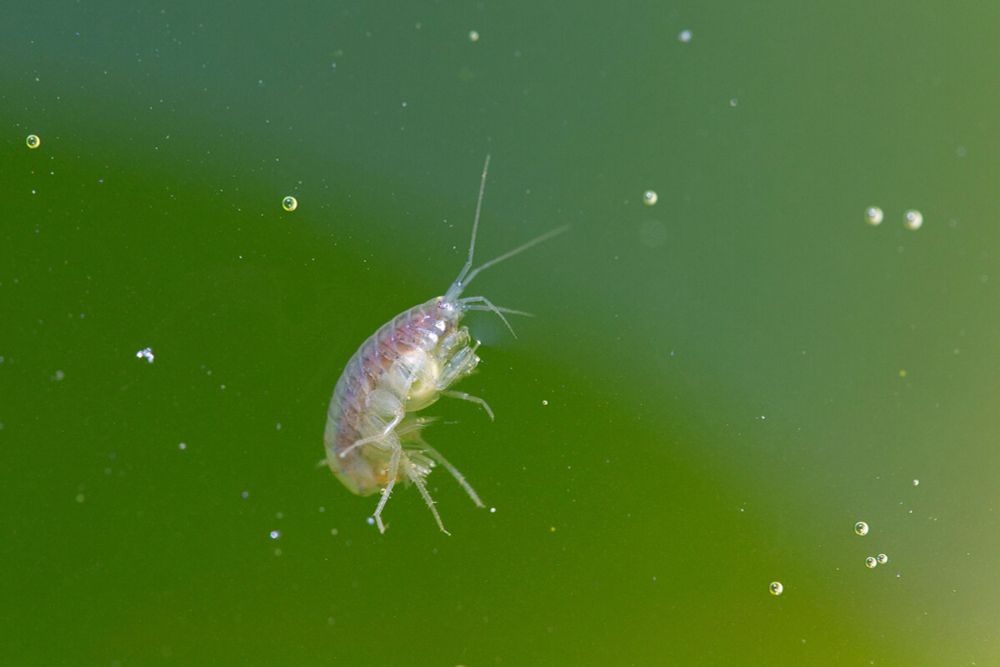
Urban environments promote adaptation to multiple stressors
19 February 2025/Kiel. Animal populations from urban areas show significantly higher resilience to stressful environmental conditions. This was found by an international team of researchers led by Dr ...
🏙️ Animal populations from urban areas show significantly higher resilience to stressful environmental conditions.
💡This was found by international researchers led by Dr Elizabeta Briski (GEOMAR). The study is published today in the journal Ecology Letters.
🔗 www.geomar.de/en/news/arti...
19.02.2025 10:57 — 👍 21 🔁 12 💬 0 📌 0
NHS worker, Belfast. Mum. European/Irish 🇪🇺 ☘️Hoping for a calmer, kinder world for all. Judge a government on how they look after their poor, sick and elderly. 🧐 #equality #nobillionaires
Flexpert ecologist, postdoc at the National Research Council of Italy, member of the IUCN Invasive Species Specialist Group, Associate Editor for @biolinvasions.bsky.social 👾
researchgate.net/profile/Dino-Biancolini
Postdoc at the University of Innsbruck using eDNA to monitor biodiversity 🪰🌺🧬
Recent MSc graduate (she/her) enthusiastic about #bioinvasions management and sea anemones 🇨🇦🌍🌊🪼
Prof, interim Director Institute for Global Food Security, Queen’s University Belfast, Welsh speaker
Investigador Principal CONICET
Grupo de Ecología en Ambientes Costeros - IPEEC
Editor Asociado para Biological Invasions (First Records Collection)
Editor Asociado para Aquatic Invasions
Consejo Asesor Editorial para Ambio
Plant Ecology | Evolutionary Biology | Invasion Biology | Plant-Microbe Interactions | Biogeography
FFN+ PDRF at the University of Exeter.
Aquatic stressor biologist researching microplastics | microfibres | invasives | pollutants | fishes
Exeter Marine | Global Systems Institute | BU Visiting Fellow | FSBI council member | BRC Freshwater Fish Verifier
UKRI Future Leaders Fellow & Essex Uni Assoc Prof. Marine biologist obsessed with 🐟 movement. FSBI Council, Fish & Fisheries Editor. Otolith starter pack: https://go.bsky.app/2TPiypt. Video game/ animation about connectivity: www.tinyurl.com/MFCTeacherPack
British Ecological Society Invasion Science Special Interest Group
https://www.britishecologicalsociety.org/content/invasive-science-group/
NERC & BBSRC funded Doctoral Landscape Award between University of Aberdeen and Queen's University Belfast
quartiles-dla.ac.uk
Mosquitoes, Wolbachia, gut microbes, microbiomes, arboviruses, Plasmodium. Liverpool way. 🦟🦠
Ecology | Evolution | Populations | Space | Models | Data | Things that make me laugh or cry.
Prof at Curtin University. Living on Whadjuk Noongar country.
Lab: popbiolgenomics.org/
Senior Lecturer @Queen's University Belfast, passionate about understanding the fascinating battle between intracellular pathogens & hosts and finding new antimicrobials to cure infections. #CellularMicrobiology, #Legionella. All views my own.
Gut microbes & Neurodevelopment 🧠🦠|Neurovascular Interactions | Brain and Gut Barriers | Senior Lecturer at UCC and APC Microbiome Ireland | Member Young Academy Ireland
Madrid -> Frankfurt -> Cork
Aburto-lab.org
Biological invasions, freshwater ecology, crayfish-lover and keen on cycling
Invasion ecologist at HUN-REN Centre for Ecological Research, Budapest.
(he/him/lui) Lecturer in Italian, University of Galway. Passionate about translation, migration, intercultural communication.
Member of the Young Academy Ireland
All views are mine, or something that I read in a book.


























